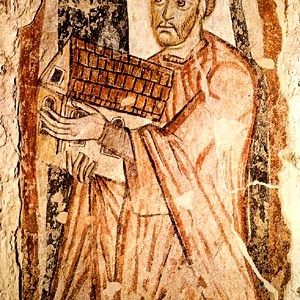“From the time the Gospel was first preached, the Church has known the process of encounter and engagement with cultures.” (Fides et Ratio, 70)
The relationship between Holy Mother Church and our modern American culture is increasingly strained. The abuse scandals, the decline in public morals, and the encroaching secular ideologies make evangelizing the culture increasingly difficult. However, we must not despair. As St. Pope John Paul said, the Church is an institution accustomed to colonizing heaven and She knows the process of how we ought to encounter and engage the culture, even secular culture. Our Faith has the potential to inform culture by the conversion and formation of conscience in such a way as to edify human communities by realigning education, politics, family and economics with the Natural Law.
What is Culture?
“it is one of the properties of the human person that he can, achieve true and full humanity only by means of culture.” (1, TPAC)
The Church document Towards a Pastoral Approach to Culture (TPAC) is a vital aid to understand and consider of the relationship between Faith, culture and society. It is very clear that we Catholics are responsible not only for spreading the Gospel in cultures foreign to Christianity, but also for revitalizing Christian culture at home; which has been increasingly de-Christianized. To help us engage modern culture with practical suggestions to inculcate the New Evangelization, the Pontifical Council for Culture wrote TPAC in 1999. The hope is that with the wisdom of the ages made accessible to this modern age, we might participate in the renewal of culture by our pastoral approach.
To discuss the renewal of culture requires first that we understand what culture is. Culture is, at its most basic, the collection of goods a society holds in common such as beliefs, language, rituals, and art. Culture provides a group with its identity. Culture is shaped by the contributions of individuals over time as a result of how they live out their lives. In paragraph 4 of Gaudium et Spes, we learn that culture is a component of the common good as “the sum of those conditions of social life which allow social groups and their individual members relatively thorough and ready access to their own fulfillment.”
We live in an era trying to separate Church and state and at the same time, trying dissolve the connection between state, faith and culture. Culture is still capable of transmitting values to a society. An authentic encounter with Truth causes a conversion which makes a witness grow in holiness and thus become an efficient cause of the New Evangelization. The Faith has an immense impact on culture. Our efforts to evangelize culture require a significant amount of pastoral care. As we learn in TPAC part 51 “Culture is so natural to man that human nature can only be revealed through culture. In a pastoral approach to culture, what is at stake is for human beings to be restored in fullness to having been created ‘in the image and likeness of God.’” Considering the cultural decline in the last several centuries, the need is greater than ever to restore man’s understanding of himself as he is illuminated by the light of Christ.
All the components of the New Evangelization come to bear on our considerations of culture and the impact our pastoral work can have on it. In TPAC paragraph 7 we are reminded that the Gospel brings with it the rightful hope for joy and man’s capacity for joy. The content of the New Evangelization is found only in “the living and personal Gospel, Jesus Christ himself.” for it is the good news and “the bearer of joy that the Church announces each day, and to whom the Church bears testimony before all people” who are capable of transforming culture for the better.
To reinforce the proper understanding of joy in this pastoral work, “the good news is the proclamation that suffering can even have a positive meaning for the individual and for society itself, since each person is called to a form of participation in the salvific suffering of Christ and in the joy of resurrection, as well as, thereby, to become a force for the sanctification and building up of the Church.” (TPAC, 54) As a culture increasingly averse to suffering, this aspect of cultural renewal is especially vital.
Conscience is also amply represented in TPAC because we are always to associate the freedom of conscience in accord with human dignity to guide our pastoral work in revitalizing culture. It is obvious that many civil laws violate certain God given rights and we must make sure to always keep in mind that “the right to life and to integrity, the right to a house and to work, the right to a family and responsible parenthood, the right to participation in public and political life, the right to freedom of conscience and the practice of religion” ought to be kept inviolable. e must not be rigid rejecters of all things not Catholic, but rather recognize, as did St. Paul at the Areopagus, that we may sanctify what is true in other cultures while rejecting those elements which are offenses against human dignity. (TPAC 5)
A glaring example of the conflict of conscience and civil law is the modern attitude towards the unborn. Our pastoral work respecting conscience is particularly challenged by the culture of death manifest in the biotechnology and immoral “medical” practices that thwart God’s plan for pro-creation. As TPAC informs us in paragraph 38,“the moral conscience of humanitynot able to turn aside or remain indifferent in the face of these gigantic strides accomplished by a technology that is acquiring a continually more extensive and profound dominion over the working processes that govern procreation and the first phases of human life.” While being pastoral, we must strike a balance between truth, justice, and charity.
Go Out and Teach All Nations!
Education and culture are both efficient and formal causes of society. It is central for Catholics to inculcate Catholic Truth to inform culture. The Church Fathers give it much due attention. In Ecclesiam Suam, paragraph 15, Pope Paul VI explains that the Christian roots of culture are not just for Catholics, but for humanity as a whole regarding things “such as peace among nations and among social classes, the destitution and famine which still plague entire countries….., the current of modern thought and Christian culture, the sad conditions of so many people….. and, the moral problems regarding birth and so on.” Our culture ought to flow from the Natural Law as it corresponds to the economy of salvation.
St. Paul evangelized culture in Athens with the unknown god. In Acts 17:19-20 the Athenians were suspicious of Paul and asked him “May we know what this new teaching is which you present? For you bring some strange things to our ears; we wish to know therefore what these things mean.” Paul brilliantly appealed to their culture when he pointed out in Acts 17:22-23 ““Men of Athens, I perceive that in every way you are very religious. For as I passed along, and observed the objects of your worship, I found also an altar with this inscription, ‘To an unknown god.’” He proceeded to reveal God’s truth to the Athenians through their cultural symbols.
Something similar can and must be done today with our culture. We are still a very religious people, even if our religious drives have taken us to material idols. We must strive to evangelize culture by our words and deeds as St. Paul did in Acts. We are called to “go out and teach all nations” and TPAC reminds us of the pastoral care we must have in order to renew our culture in a way that colonizes Heaven. The essential difficulty in evangelizing the culture today may rest in the confusion between first and second things. It has become our custom to focus on the temporary rather than the eternal, a trend we must invert.
The Gospel works to renew culture with the joy conveyed by a witness to truth. Inside and outside of the Church, hope is revived by the life death and resurrection of Christ and thus culture is potentially renewed. In our pastoral attempts to renew culture we would be wise to heed Msgr. Knox’s dictum “we are here to colonize heaven, not make things better on earth.” The beautiful paradox that follows putting first things first is that if we colonize heaven, things will get much better on earth. Go out and teach!
✠
Image by Binh Ho Image via Pexels












